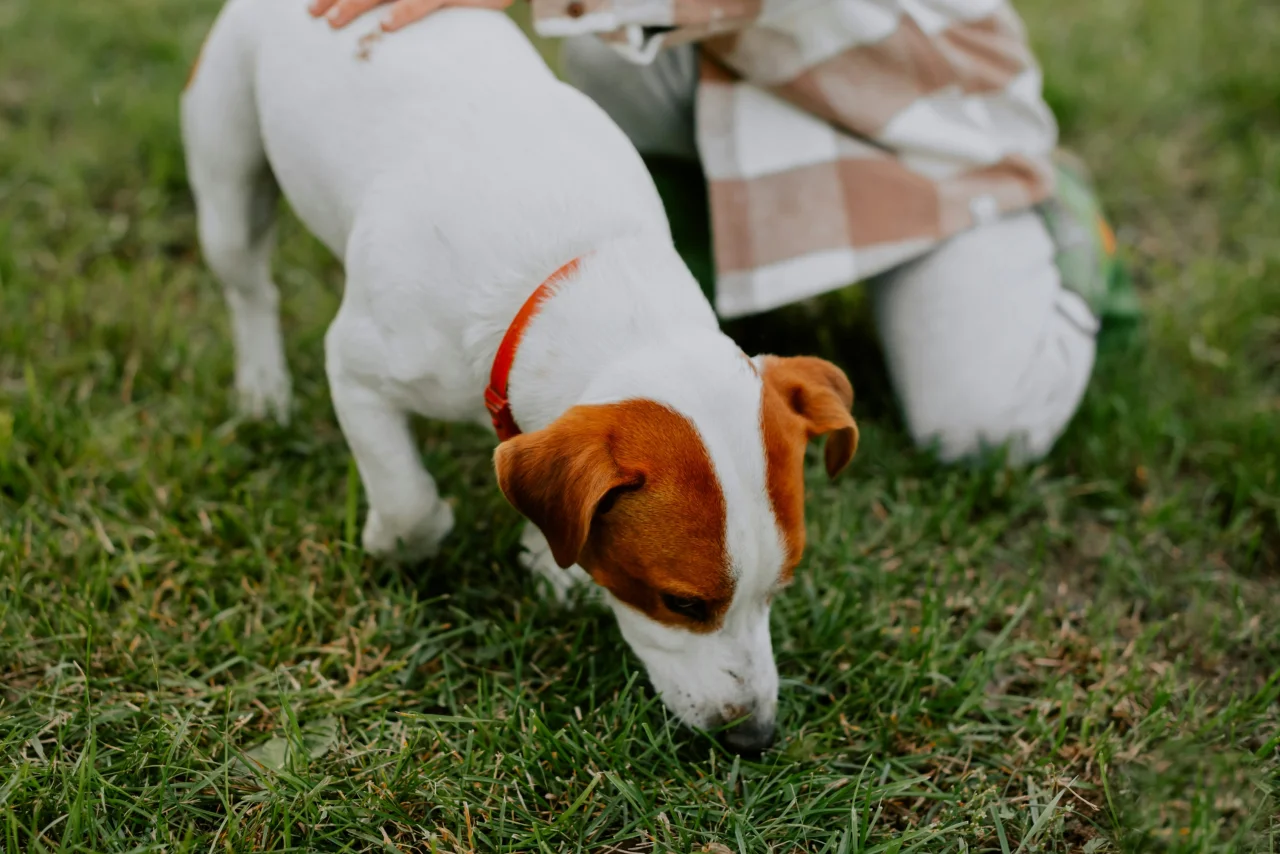“Why is my dog eating grass?” This is one of the most common head-scratching moments pet parents experience. You feed your dog a complete and balanced diet, you give them toys, walks, and love, and then suddenly you catch them chowing down on your lawn like a furry little lawnmower.
So, what gives?
At Off Leash K9 Training Tulsa, we’ve worked with all kinds of dogs, from high-energy puppies to older rescues. Grass eating comes up a lot. It’s not always a bad thing, but it can sometimes be linked to issues that need your attention. In this guide, we’re getting into exactly why dogs eat grass, what it might mean, when you should worry, and what you can do to stop eating grass if it’s becoming a habit.
Your Dog Is Eating Grass. Is This Common Behavior?
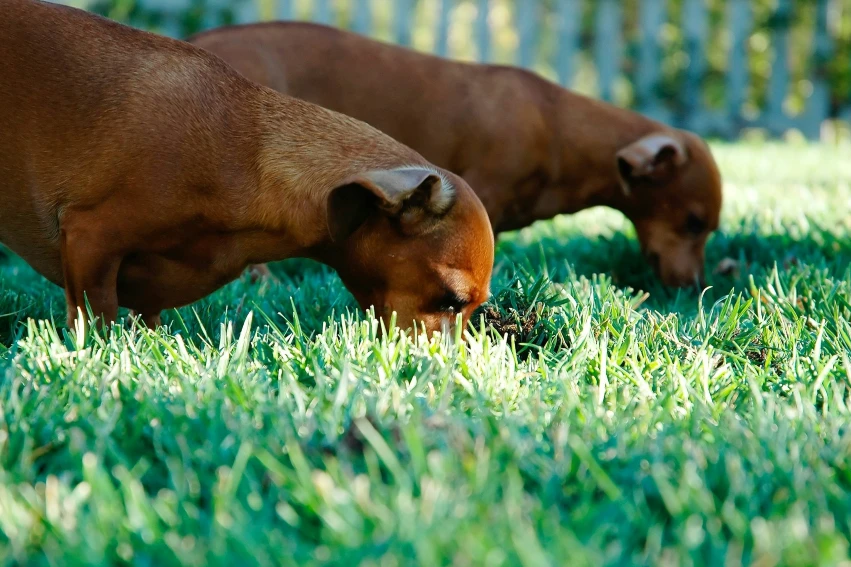
For most dogs, eating grass is actually pretty normal behavior. It probably looks weird, especially when your dog has a full bowl of premium kibble inside and still chooses to snack on plants outside. But it’s not just your dog. Many dogs do this, even the healthiest ones. In fact, in a survey of 1,500 dog owners, nearly 70% reported that their dogs ate plants either daily or at least once a week.
In fact, research has shown that grass-eating dogs are extremely common. This isn’t some rare or odd behavior. Even younger dogs, especially those still exploring the world, are more likely to chew on grass just because they’re curious.
That said, just because something is common doesn’t mean it’s always harmless. So let’s take a look at why your dog is eating grass in the first place.
Common Reasons Why Your Dog Is Eating Grass
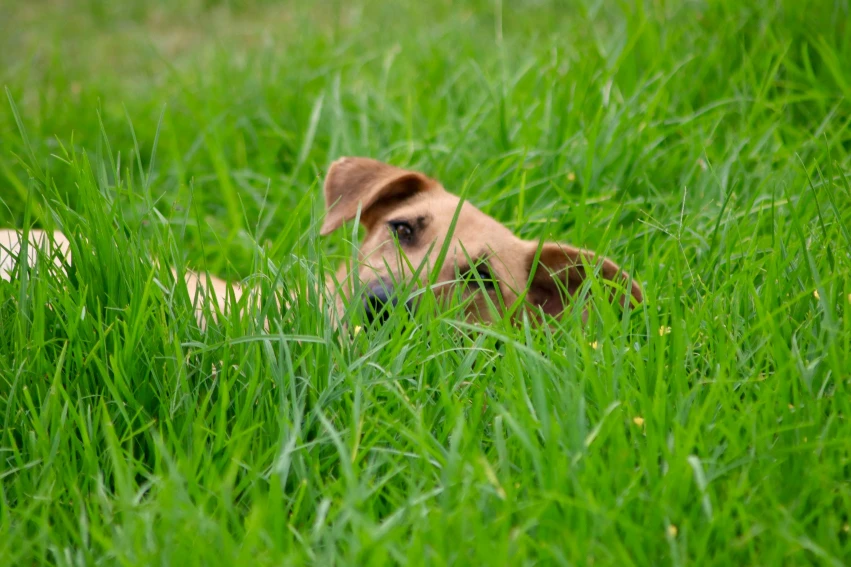
There isn’t one single answer to explain why dogs eat grass. It could be anything from boredom to instinct to something missing in your dog’s diet. These are the most common explanations and how they might apply to your pup.
1. It’s a Leftover Instinct from Wild Canids
Way before they were napping on couches and wearing t-shirts in family photos, dogs were wild animals. For your dog’s ancestors (e.g., wolves, coyotes, and other wild canids), eating an entire animal provided them with a balanced diet. That included stomach contents, which were often filled with plant material.
So, it’s believed that domestic dogs might retain that same drive. Even if your dog isn’t hunting dinner, the urge to chew greenery like grass could be hardwired from those early generations. Sometimes, dogs may eat grass just because their body remembers when it was part of a meal.
2. They’re Trying to Fix an Upset Stomach
One of the most common theories is that dogs eat grass when they have an upset stomach, and there’s actually some truth to it. Some dogs vomit after eating grass, which has led experts to believe that certain dogs may use grass as a way to induce vomiting when they’re not feeling great.
However, most dogs who eat grass don’t throw up. And even when they do, that doesn’t automatically mean the dog is sick. But if you notice your dog eating grass on an empty stomach and throwing up yellow foam or bile often, it’s worth checking with your vet to rule out any gastrointestinal disease or underlying illness.
3. They’re Bored
Boredom can make all of us do odd things. Dogs are no exception. When there’s nothing else to do in the yard, some dogs turn to grass-eating behavior as a way to pass the time or keep themselves busy. It’s one of the easiest ways for dogs to relieve boredom, especially if they’re not getting enough mental stimulation during the day.
If your pup is left alone for long stretches or doesn’t have enough enrichment, this kind of grass eating can become a habit.
4. They Like the Texture or Taste
Yes, for some dogs, grass just tastes good. Especially fresh spring grass that’s still damp in the morning. It’s crunchy, earthy, and might even feel soothing to chew. Not every dog that eats grass is doing it because something is wrong. For some, it’s just like a kid chewing on their shirt sleeve.
5. They’re Missing Something in Their Diet
Another theory is that eating grass might help with dietary deficiencies. Maybe your dog is low on fiber. Maybe they’re craving an essential nutrient that’s not in their regular food.
But even dogs fed a perfectly balanced diet still sometimes eat grass. So while nutritional deficiency could be the reason, it’s not the most common one. Still, if your dog’s been on the same kibble for seven years, it might be time to ask your vet if it’s still meeting their needs.
6. They’re Dealing with a Health Problem
While not as common, grass eating can sometimes be linked to deeper issues like inflammatory bowel disease, parasites, or other gastrointestinal diseases. If your dog is obsessively eating grass, especially along with other symptoms like weight loss, diarrhea, or lethargy, it’s best to get them checked out.
Some dogs with intestinal parasites also show a sudden change in behavior, like eating non-food items or gulping too much grass all at once. If your dog is showing signs of discomfort, trust your gut and schedule a vet visit.
Can Your Dog’s Grass-Eating Habit Make Your Dog Sick?
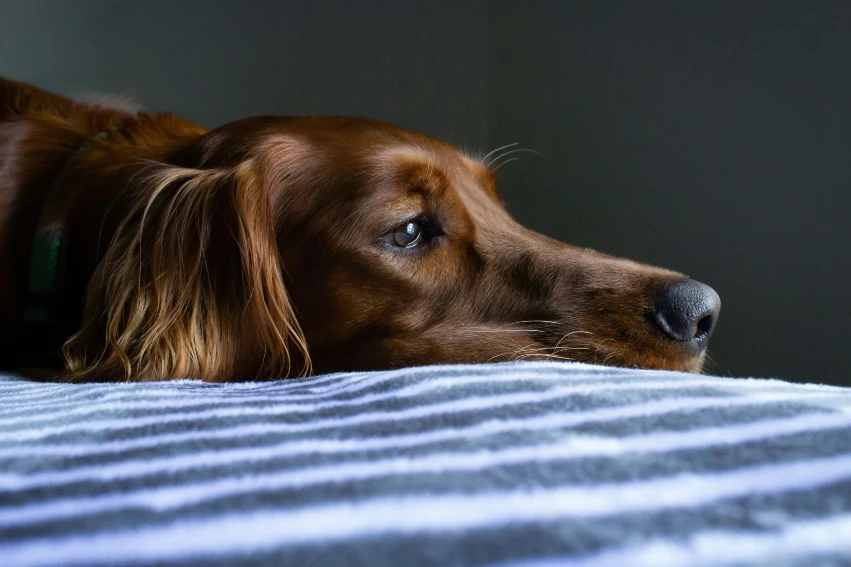
Here’s the part that matters most for cautious dog owners: Is eating grass bad for your dog? Most of the time, no. But there are a few risks worth knowing:
1. Chemicals and Pesticides
If your dog is munching on treated lawns, you’ve got a problem. Pesticides, herbicides, and fertilizers are toxic, and even small amounts can cause vomiting, diarrhea, or worse. So it’s best to avoid letting your dog graze in public areas or on recently treated lawns.
2. Grass and Parasites
We already touched on this, but just a reminder: grass can carry parasite eggs left by other dogs, wildlife, or even birds. This could lead to a nasty case of worms or a more serious gastrointestinal disease. Regular deworming is the way to go.
3. Blockages and Choking Hazards
Most dogs chew grass and move on. But if your dog swallows large quantities of grass, especially long blades, it could cause a blockage in the dog’s stomach or intestines. If your dog suddenly stops eating, seems bloated, or is straining to pass stool, it could be a blockage, and that requires a vet trip.
How to Stop Your Dog from Eating Grass
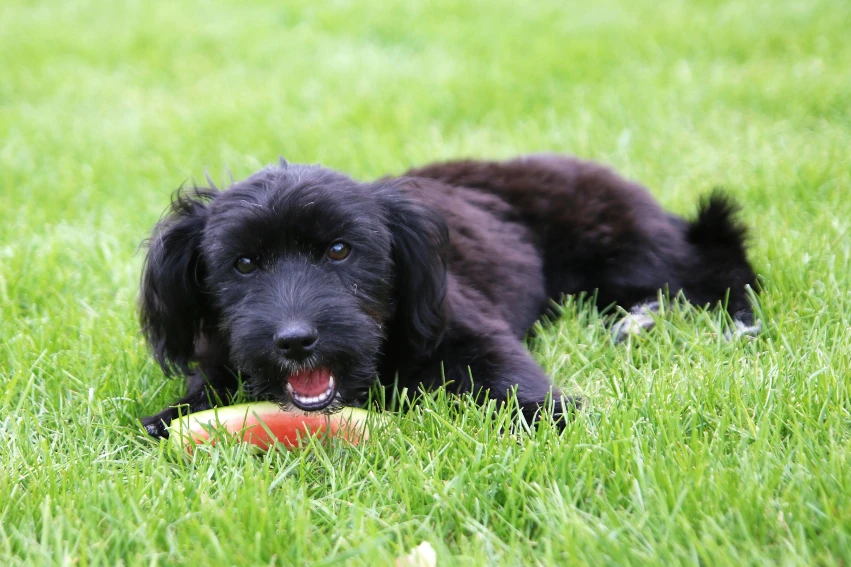
If your dog’s lawn obsession is turning into a problem, here are some ways to gently break the habit.
1. Improve Their Diet
Start with what they’re eating. Talk to your vet and make sure your dog’s on a complete and healthy diet. If fiber is the issue, add dog-safe veggies like cooked pumpkin or green beans to help smooth things out.
2. Give Them Something Better to Do
One of the best ways to stop eating grass? Replace it with something better. Tug toys, food puzzles, fetch games. Basically, anything that gives your pup something else to focus on besides your lawn. This is especially helpful for younger dogs or dogs left outside for long stretches.
3. Train a Solid “Leave It”
Want your dog to stop mid-graze when you call their name? A well-trained “leave it” command can save your grass (and your sanity). And that’s exactly what we teach at Off Leash K9 Training Tulsa. Our basic obedience training programs help dogs learn how to respond with laser focus, even when they’re tempted by a patch of tasty weeds.
4. Supervise Outdoor Time (For Now)
Until you’ve got the behavior under control, stick close when your dog is in the yard. Interrupt the grazing and redirect with a toy or command. Over time, consistency makes a huge difference.
When to Talk to Your Vet
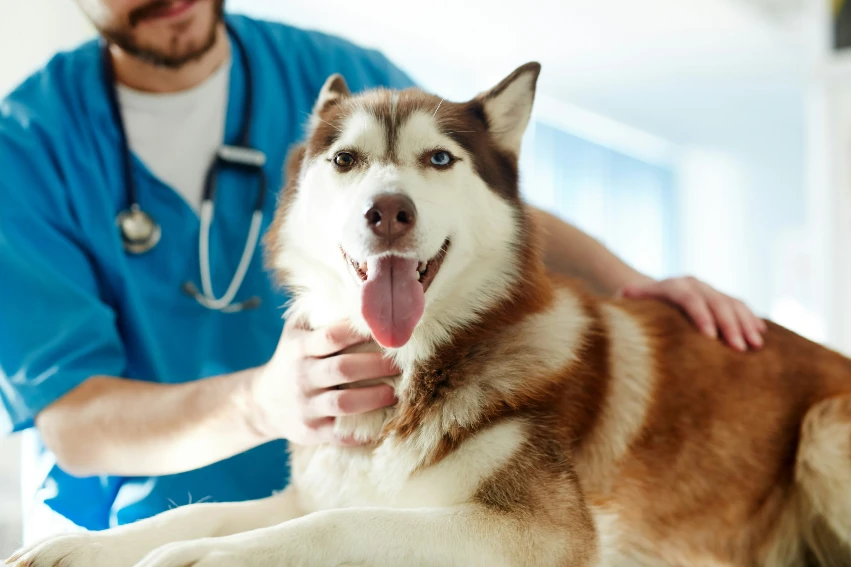
Sometimes, grass eating is more than just a quirky habit. Get professional help if your dog:
- Eats grass daily or compulsively
- Is vomiting frequently
- Stops eating or loses weight
- Seems lethargic or withdrawn
- Has diarrhea or blood in their stool
Struggling With Unwanted Habits like Grass Eating? Our Team Can Help
If your dog’s grass-eating behavior is becoming more than just a weird quirk, it’s time to do something about it. At Off Leash K9 Training Tulsa, we help dogs (and their humans) overcome unwanted behaviors, like keeping your dog from eating grass, through structured training, clear communication, and positive routines.
From basic obedience to behavior modification, we’re here to help your dog tune in, follow your lead, and stop munching grass like it’s their job.
Give us a call today, and let’s take grass off the menu.

